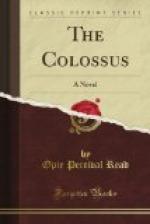CHAPTER XXIX.
A DAY OF REST.
Early the next morning Henry and Richmond were on a train, speeding away from the roar, the clang, the turmoil, the smoke, the atmospheric streams of stench, the trouble of the city. They saw a funeral procession, and Richmond remarked: “They have killed a drone and are dragging him out of the hive, and as they have set out so early they must be going to pay him the compliment of a long haul.” They passed stations where men who had spent a quiet night at home paced up and down impatiently waiting for a train to whirl them back to their daily strife. “They play cards going in and coming out,” said Richmond, “but at noon they are eager to cut one another’s throats.”
They ran through a forest, dense and wild-looking, but in the wildness there was a touch of man’s deceiving art. They crossed a small river and caught sight of a barefooted boy trying to steal a boat. They sped over the prairie and flew past an old Dutch windmill. It was an odd sight, an un-American glimpse—a wink at a strange land. They commented on everything that whirled within sight—a bend in the road, a crooked Line, a tumble-down fence. They were boys. They talked about names that they held a prejudice against, and occasionally one of them would say, “No, I don’t like a man of that name.”
“There,” Richmond spoke up, “I never knew a man of that name that wasn’t a wolf. But sometimes one good fellow offsets a whole generation of bad names. I never liked the name Witherspoon until I met you.”
“How do you like DeGolyer?” Henry asked.
“That’s not so had, but it isn’t free from political scandal. I rather like it—strikes me that there might be a pretty good fellow of that name. Let me see. We’ll get off about three miles this side of Lake Villa and go over to Fourth Lake. The woods over there are beautiful.”
“We should have insisted on McGlenn’s coming,” said Henry.
“No,” Richmond replied, “the country is a bore to John. Once he came out with me and found fault with what he termed the loose methods of nature. I pointed out a hill, and he said that it wasn’t so graceful as a mound in the park. I waved my hand toward a pastoral stretch of valley, and he said, ‘Yes, but it isn’t Drexel Boulevard.’ Art is the mistress of John’s mind. His emotions are never stirred by a simple tune, but the climax of an opera tumbles him over and over in ecstasy. He is one of the truest of friends, and he is as game as a brook trout. He has associated with drunkards, but was never drunk; and during his early days in Chicago he lived with gamblers, but he came out an honorable man.”
“I have been reading his novels,” said Henry, “and in places he is as sharp as broken glass.”
“Yes, but he is too much given to didacticism. Out of mischief I tell him that he sets up a theory, calls it a character, and talks through it. But he is strong, and his technique is fine.”




